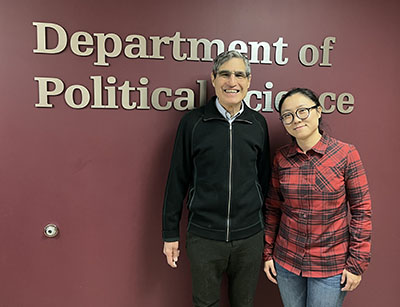
Wenjing Gao with PhD Supervisor Jeremy Paltiel
Wenjing’s thesis, “Encountering the BRI: India’s Pride and Prejudice?”, supervised by Jeremy Paltiel, examines the complex dynamics between India and China within the context of China’s Belt and Road Initiative (BRI).
Although China’s BRI offers a significant opportunity for accelerating development through infrastructure projects, India has notably opted out of this program. Wenjing’s research seeks to understand the rationale behind this decision, largely weighing on constructivist explanations while also acknowledging realism.
Her study underscores that India’s rejection is more deeply rooted in constructivist explanations, particularly those pertaining to the construction of ‘self’ and ‘other’. A key part of her analysis involves an exploration of India’s endogenous and exogenous identity ambivalence, with China playing the role of a significant ‘other’. Within this context, India’s approach to China is heavily influenced by its historical and cultural perspectives, subtly shaping its national identity and responses to China’s growing influence in the process. While strategic considerations intrinsic to realism are acknowledged, Wenjing argues that constructivist explanations offer a more encompassing understanding of India’s position.
She also extends Gourevitch’s “Second Image Reversed” to include identity shifts, demonstrating how China’s rise prompts India to reassess and reshape its identity.
Her research provides valuable insights into how a nation’s perceived identity and desire for ontological security influence its external engagements. It presents a nuanced perspective of Global South diplomacy in the 21st century, focusing on the ambivalence and complexities involved in international encounters.
Congratulations Wenjing!